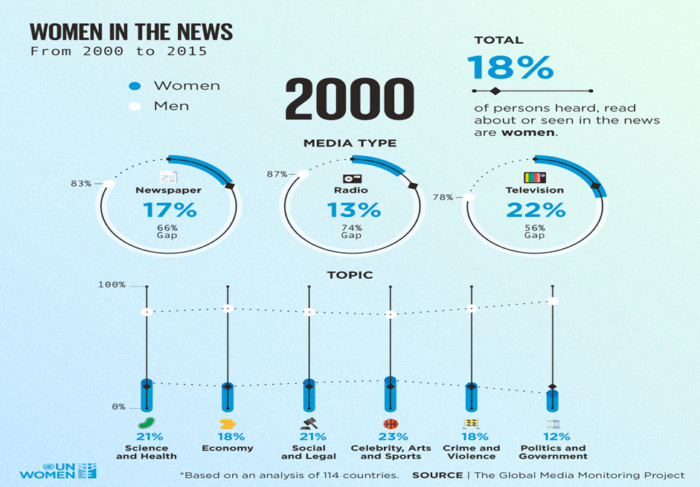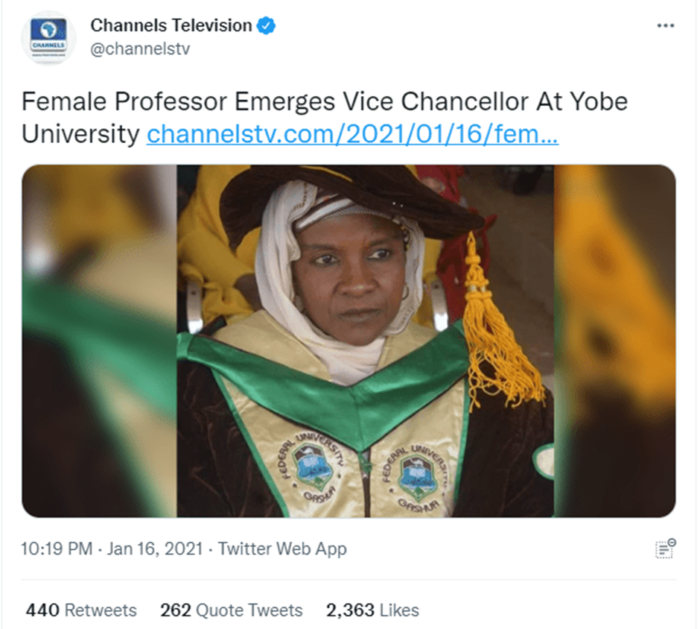Groundbreaking Workshop on AI and Technology-Facilitated Gender-Based Violence at AWiM24
Trending
Tuesday May 27, 2025
Trending

A 39 year-old nurse, Mawedo, sits on the edge of her bed, as the room crackles with tension, a tangible manifestation of the invisible weight she carries.
She stares absentmindedly at her phone. Her calm demeanour was a stark contrast to the silent chaos within.
Her phone screen, once a window to the world, now displays a barrage of screaming headlines showing contempt for the female gender: ‘Woman Accused of Killing Husband,’ ‘Nigerians Demand Paternity Test from Singer’s Wife,’ ‘Female Minister Embezzles Public Fund,’ ‘Lady Accused of Stealing Birthday Dress.’
The bias in the narratives resonates deeply with Mawedo, bringing back painful memories of a period when she was accused of setting a poor example for her three daughters, by being divorced.
After her ten-year-old marriage which was marred by domestic violence came to an end, a simple photo of her, captioned with a whiff of happiness, was enough to trigger a storm of societal disapproval.
“The stories paint a picture of the relentless narrative that dominates Nigerian media. Women are represented as perpetrators, as suspects, as objects of suspicion,” says Mawedo.
She describes it as a persistent undercurrent. “The violence, the blame, the lack of empathy. It’s like we’re living in a world where women are always the problem, and should not be victims.”
Her sentiment echoes the reality for millions of Nigerian women. A United Nations Population Fund (UNFPA) reports that an alarming one in three women has suffered abuse in their lifetime.
Sadly, the media mirrors this epidemic of violence as only 4 per cent of traditional news and digital news stories worldwide clearly challenge gender stereotypes.

“I think the media is not very kind to women in terms of reportage,” says Abuja-based Development Communications Specialist and Period Advocate, Morenikeji Olonilua.
“Let’s say that a woman in a position of authority is found to be involved in the embezzlement of public funds. The style of reporting would typically be tougher against her while showing some tolerance for men who commit the same crime.”
Felicia Aina Dairo, Project Manager at the Centre for Journalism Innovation and Development (CJID), opines that “Too often, the media’s portrayal of women and girls ignores their accomplishments and true personalities.
For instance, Nigeria’s First Lady, Senator Oluremi Tinubu, was recently referred to as the ‘wife of the President’ in a report on the activities of her foundation. But that’s not all she is!”
There are two major ways that women are portrayed in the media, according to Justina Asishana, a data and investigative journalist with The Nation.
“Women are often underrepresented when it comes to important national issues, including those that affect them. Their voices are often not heard enough. They are also seldom consulted as sources even on matters that affect them.”
Secondly, even in situations where they have clearly been victimized, women are often stereotyped and made to take the blame. Like in some rape cases, you will hear insinuations that it happened because of the way she was dressed. And if the woman was raped by a prominent person, it would be claimed that she seduced him. If there was an accident and one of the drivers is a woman, there is an assumption that she is the cause of the accident because ‘she is a woman’. So, women have not always been portrayed fairly in the media. Although some women in the media are trying to change this narrative, more work needs to be done.”
“This is not just about individual stories, but about the broader narrative,” says Ene Ameh, a Nasarawa-based radio presenter.
“The constant barrage of negative portrayals of women creates a climate where violence against them is seen as almost inevitable as if it’s something they’ve brought upon themselves. The representation of women in the media is echoed in millions of homes across Nigeria and one that the media often reinforces —for better or worse.”
A 2020 research on the portrayal of women in select Nigerian television content has shown that, despite evidence supporting women’s progressive roles in society, they are often portrayed in television content as sex objects, dependent on men, domestic workers, and incapable of taking on leadership roles rather than as professionals or members of society who contribute to nation-building.
For instance, Professor Maimuna Waziri, the Vice-Chancellor of Federal University Gashua, was identified only as “Female Professor” in a 2021 news headline. The fact that she was competing against 47 other professors for the Vice-Chancellorship made no difference to the reporter.

One study also found that when reporters cover women in politics, they often use terms that emphasize women’s traditional roles and focus on their appearance. They perpetuate stereotypes of women politicians as weak, indecisive, and emotional.
“It is bad enough that Nigerian women do not have enough representation in governance but it is worse that for the few that we have, there’s almost no platform for conversation for them in the media,” Olonilua says.
“Women are mostly remembered for their contributions to governance and society when it’s ‘Women’s Day,’ and it’s almost like we are decorations of some sort.”
For a country with a female population of 49.46 per cent, this speaks to the power of narrative, according to Ameh. “We can all see how gendered media reporting can foster a culture of silence and discrimination. It’s sad how biased and inadequate reporting normalizes harmful behaviours, creating an environment where women feel powerless.”
James Ojo, an investigative journalist and Senior Copy Editor at Legit.ng concurs that this toxic narrative of women in the media has real-world consequences. “It emboldens abusers, discourages women from reporting abuse, and hinders the progress of justice. It creates a digital cage for women, trapping them in a cycle of fear and silence.” The solution? He says a fundamental shift in the media’s approach to reportage on women is needed.
“It’s time to move on from sensationalism to narratives that emphasize accountability, empathy, and justice. Journalists must be trained to report on women with sensitivity and accuracy.
Media organizations must also adopt ethical frameworks that prioritize the voices of survivors and challenge harmful stereotypes,” according to Ojo.
“The media needs to adopt a more unbiased approach to gendered reporting, one story at a time.”
The digital age, according to Dairo, offers unparalleled opportunities for capacity building to challenge these narratives and amplify the voices of women. “Journalists need to be constantly trained on how to use the power of the media to build a safer, more just society, especially for women, ”
Asishana argues that “there is a need for those at the helm of affairs, especially in broadcasting, to stop the objectification of women, particularly in music and films. Movies and songs that objectify and sexualize women while dignifying men’s personalities ought to be banned.”
“Additionally, it would be very beneficial if journalists and the media actively find female sources so that the female perspective is included in their reports.”
“This battle for a better media representation of women is far from over, but the discriminatory media treatment that women experience reminds us that the digital world is not a virtual escape from societal pressures; it is merely an echo chamber where those pressures manifest,” says Ojo.
Stories like Mawedo’s and countless other women’s are significant because they point us to a media and digital space in dire need of more empathetic and unbiased representations. The future is counting on a media that empowers, informs, and inspires.
Only then can the weight of accusation, suspicion, injustice, and abuse be lifted, and the voices of women be finally heard.
We’re not gonna spam. We’ll try at least.

Copyright 2020. African Women In Media
Copyright 2020. African Women In Media
Recent Comments